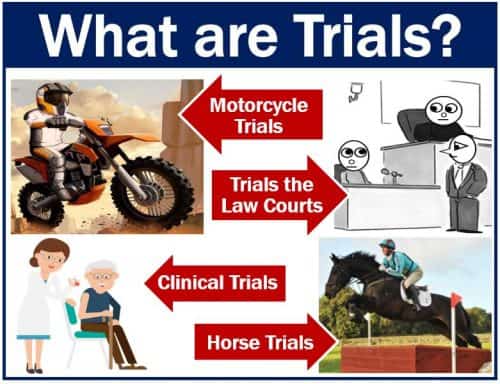What are trials? Definition and examples
Trials may be tests of quality, performance, or suitability of things or people. The term might mean formal examinations of evidence in a law court with a judge, often before a jury. A court trial determines, for example, whether somebody is guilty or not guilty of breaking the law.
The term may also refer to a competition with horses, dogs, or other animals. Horse trials, for example, are equestrian events in which competing horses and their riders must take part in several different contests.
The Oxford Living Dictionaries has the following definitions of the word trial:
“1. A formal examination of evidence by a judge, typically before a jury, in order to decide guilt in a case of criminal or civil proceedings.”
“2.1 A test of the performance, qualities, or suitability of someone or something. 2.2. A test of individual ability on a motorcycle over rough ground or on a road. 2.3 (Plural) An event in which horses, dogs, or other animals compete or perform.”

Experimental periods
Trials may be experimental periods during which a person or thing is being assessed. A new employee, for example, may not get a permanent job offer until he or she has completed a trial period.
What are clinical trials?
Clinical trials are research studies involving human volunteers. Researchers compare either a new or different type of medication or treatment with the best ones that are currently available.
Some clinical trials may look at ways of preventing illnesses, for example, by testing a new vaccine.
A new drug or treatment may do extremely well in laboratory tests. However, we must also determine how well it does when administered to a large number of human patients. Only then can we know what its benefits and risks are.
The MRC Clinical Trials Unit at University College London says the following about this kind of trial:
“Trials aim to find out if treatments are safe (what side effects they have), and if they work better than the treatment used currently.”
There are four types:
Phase I trials
In this phase, researchers test the safety of the treatment. They look at its side effects. Higher blood pressure, headaches, dizziness, and nausea, for example, are possible side effects.
In Phase I, only a small number of volunteers take part. In the majority of cases, they are healthy people.
Phase II trials
This phase involves a larger group of people. In most cases, the volunteers have the condition or illness which the medication or treatment targets.
The researchers aim to determine whether the treatment is safe. They also want to see whether it has an effect on the volunteers’ condition or illness. This stage usually has fewer than 100 people.
Phase III trials
This phase includes a much larger number of patients; perhaps hundreds or even thousands. Researchers typically select the patients randomly to receive the new treatment or the best available treatment.
In some cases, there is also a placebo group. A placebo is a dummy or pretend drug. It has no active ingredient, but the participants do not know this.
In this phase, the aim is to determine how well the new treatment works. It takes much longer to complete than the previous two phases.
Phase IV trials
Researchers carry out this phase after the regulatory authorities, such as the FDA, have approved the treatment. For example, if it is a new drug, after doctors start prescribing it. FDA stands for Food and Drugs Administration (of the United States).
The researchers gather and analyze data on the medication’s effect on various populations. They also try to find out what its side effects might be after long-term use.
Etymology of ‘trial’
Etymology is the study of where words come from, i.e., their origin. It is also the study of the way the meanings of words have changed throughout history.
The term emerged in the English language in the mid-fifteenth century with the meaning “process or act of testing, a putting to proof by examination, experiment, etc.” It came from the Anglo-French word ‘Trial,’ which was formed from ‘Triet,’ meaning “to try.”
Records of the word ‘trial’ meaning “examining and deciding of the issues between parties in a court of law” date back to the 1570s.
It was not until 1806 that the phrase “trial and error” appeared.

